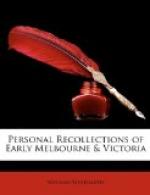I recollect and record with pleasure one of the Goldfields Commission incidents illustrative of O’Shanassy’s high public qualities. We had completed at Castlemaine, near the original Mount Alexander, our considerable tour of goldflelds inspection; and as we sat round the table of the only public room of the small hotel or public-house of the place, the evidence completed, and all the proposed changes decided on, there remained yet one question. Our proposed chief pecuniary change abolished the indiscriminate, and, to the many unsuccessful, most oppressive charge of 30 shillings monthly license fee, and substituted a yearly fee or fine of only 20 shillings. And what was this, or the documentary receipt that represented it, to be called? Reduced as the amount was, it was still a tax, and any ingenuity that could dignify or otherwise reconcile a tax, was worthy of the best statecraft. As chairman, and not having at the moment a suggestion of my own, I had to knock at the heads of my co-members. I turned to one, then another, and yet another, but without response. Even the original brain of Fawkner sent forth no sign. At length I came to O’Shanassy, who happened to be at the far end of the table. He had been waiting his turn, and the answer came promptly, “Call it the Miner’s Right.” It was but one out of many instances of his statesmanlike turn. The Miner’s Right, of course, it was called. The name passed on to many other goldflelds. I noticed it in British Columbia shortly after, with its new gold discoveries; for the Commission’s report had attracted much attention, owing to the forefront position which golden Victoria had already assumed in the world.
WILLIAM KERR, FOUNDER OF “THE ARGUS,” AND TOWN CLERK OF MELBOURNE.
“I am in the place where I am demanded of conscience to speak the truth, and therefore the truth I speak, impugn it whoso list.” —“The Argus” motto.
Another of O’Shanassy’s oft-repeated jokes was a good story about Kerr, and always told with that stereotyped good temper which I fear the latter, with his strong Orange antipathies, would, upon opportunity, have but grudgingly reciprocated. Two “brither Scots,” happening to meet one day in Melbourne, one of them, presumably not long arrived, “speered” of the other, “Did ye ken ane Weelum Kerr here aboot?” “Weelum Kerr!” replied the other, in reproachful astonishment; “No ken Weelum Kerr, the greatest man in a’ the toon!” That a hard-headed, liberal-minded commonsense Scot, as Kerr was in most things, should have had the Orange infirmity, may be excused, or at least explained, by the fact of his being of Stranraer, a Scotch town almost within hail of Ulster. That small, and not overmuch known place, has not been the least among the cities of Scotia in contributing heads and hands to the colony’s progress, including, besides Kerr and others, James Hunter Ross, a leading Melbourne solicitor, and my good old friend Hugh Lewis Taylor, who, ere well out of his teens, was made manager at Geelong, and is now manager in London, of the prosperous Bank of Victoria.




